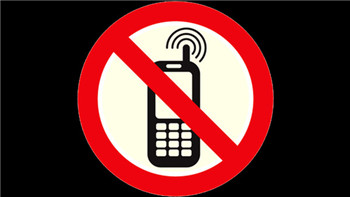(单词翻译:单击)

Fed up with his staff constantly checking emails and alerts on their smartphones, Paul Devoy decided in September to ban all phones, tablets and laptops from meetings.
因为受够了员工不停地在手机上查看电子邮件和各种提醒的行为,保罗德沃伊(Paul Devoy)今年9月决定禁止在开会时使用任何手机、平板电脑及笔记本电脑。
Consequently, the head of Investors in People, the UK body that sets workplace standards, says meetings have become much more productive as attendees are entirely focused.
这位Investors in People——一家为工作场所制定标准规范的英国机构——的负责人说,结果是,由于参与者完全集中精力,会议变得更富有成效。
The distracting pull of digital devices and the detrimental effect that has on our ability to concentrate is well documented. In one Stanford University study, people who regularly attend to electronic alerts and messages do not pay attention, control their memory or switch from one job to another as well as those who concentrate on doing one thing at a time. It is not the technology that is at fault but our inability to manage it.
数字设备导致注意力分散、不利我们集中精力是有据可查的。斯坦福大学(Stanford University)的一项研究显示,那些时不时查看电子设备提醒与信息的人无法像一次只集中精力做一件事的人那样专注、形成记忆或者切换工作。这并不是科技的错,而是我们对此没能管理好。
Mr Devoy introduced his ban on technology in meetings alongside sessions for staff on mindfulness, which he says helped to put this seemingly draconian ban into context and head off resistance.
德沃伊禁止在会议中使用科技设备,同时培训员工的专注力,他称这样做有助于这一看似严厉的禁令的执行,减少了阻力。
“It is about unitasking, not multitasking,” he says. “People are quite happy to be given permission not to have their phones with them.” Exceptions are made if important personal calls are expected.
“这事关单一任务处理,而非多任务处理,”他说,“人们很乐意被允许不随身携带手机。”如果有重要的私人电话要接,可以例外。
“These things need to be proportionate,” he says, adding he was surprised to find that his staff were receptive and some even enthusiastic about the ban.
他说:“做这样的事需要适度,”他补充说,在发现自己的员工对此表示接受甚至有的员工非常欢迎这项禁令后,他感到有些惊讶。
Mr Devoy has gone a step further in his purge of technology. He has banned PowerPoint presentations from meetings, and finds that discussion now flows more freely.
德沃伊进一步对科技设备进行了清理。在禁止在会议中进行幻灯片演示后,他发现如今讨论可以更加自由地展开。
Nena Chaletzos, chief executive and founder of online travel start-up Luxtripper, is also a convert to tech-free meetings. She runs her company’s weekly internal meeting without phones and laptops, and permits only the occasional video demonstration. Instead, for the one-hour meeting, her team of eight are asked to bring along the A3 whiteboard they have each been given, on which they write meeting notes and action points. At the end of the meeting, everyone’s actions for the week are agreed. The whiteboards are kept on show and tasks are rubbed off as they are completed.
在线旅游初创企业Luxtripper创始人兼首席执行官内娜餠莱佐(Nena Chaletzos)也开始采取不使用科技设备的会议形式。在她主持的每周公司内部例会上,不允许携带手机和笔记本电脑,只允许偶尔使用视频演示。取而代之的是,在一小时的会议中,她团队的八名成员被要求带上发给每人的一块A3大小的白板,他们可以在上面写下会议记录和行动要点。会议结束时,每个人一周的活动都可以安排好。白板继续放在大家可以看到的地方,任务完成后就可以擦掉。
“I tell them to bring their ideas and brains to the session, not their technology,” Ms Chaletzos says. Where once the meeting went on for three hours, discussion is now so much more focused and productive that it can be kept to a strict 60 minutes, she says.
“我告诉他们要把自己的想法和大脑带到会议上,而不是科技设备,“沙莱佐说。以前,开个会要持续三个小时,而现在,讨论如此地专注、高效,每次会议可以严格地控制在60分钟,她说。
At first, colleagues worried about customers being unable to reach them, but Ms Chaletzos told them that all they needed was a warning. An unexpected benefit, she says, is that meetings are much more friendly and open.
起初,同事们担心客户无法联系上他们,但沙莱佐告诉他们,他们需要的只是提前告知。她说,意想不到的收获是,会议变得更加友好、坦诚。
Technology is still very much used at the start-up but only at the right time. For example, Ms Chaletzos’s team uses Slack, which has helped end the need for other internal meetings.
在这家初创企业,科技设备仍被大量使用,但只是用在正确的时间。例如,沙莱佐的团队会使用Slack,这样就无需召开其他内部会议。
While investors might raise an eyebrow at the idea of a digital start-up embracing old-fashioned whiteboards, Ms Chaletzos sees it as the future.
虽然投资者也许会对一家数字初创企业使用老式白板的理念不以为然,但沙莱佐认为这一理念才代表着未来。


